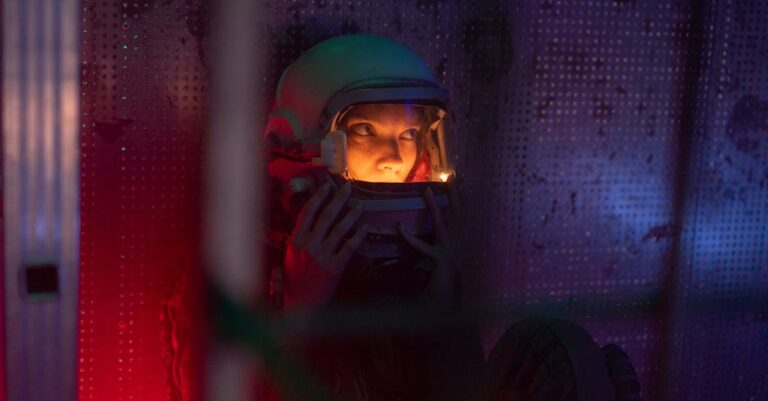
Dr. Elara Voss adjusted the neurostimulator electrodes on Kieran’s scalp, her fingers brushing against the cool metal of the device. The lab hummed with the low thrum of machines, a constant background noise that had become as familiar to her as her own heartbeat. Kieran sat across from her, his eyes fixed on the flickering screen in front of him, where a series of abstract shapes pulsed in rhythmic patterns. His breathing was steady, but his hands trembled slightly, a telltale sign of the neural stress he’d been experiencing since the third session.
“What do you see?” Elara asked, her voice even, though her pulse quickened as she watched Kieran’s pupils dilate.
He didn’t answer immediately. Instead, he tilted his head, his jaw tightening as if straining to recall something just beyond reach. Then, in a voice that sounded raw and distant, he said, “A forest. Trees like pillars, but their leaves are made of glass. They shatter when the wind passes through.”
Elara’s breath caught. The stimuli on the screen hadn’t included any visual cues related to forests or glass. She glanced at the data stream scrolling across her monitor—neural activity spiked in the hippocampus, the region responsible for memory formation. But the patterns were wrong, fragmented, as if Kieran’s brain was trying to synthesize something it shouldn’t have access to.
“Describe the wind,” she prompted, her tone deliberate.
“It’s… cold. But it doesn’t feel like air. It feels like a presence.” Kieran’s fingers curled into fists, his knuckles whitening. “It speaks. Not words, but impressions. Like memories that aren’t mine.”
Elara’s stomach dropped. The experiment was supposed to test memory reconstruction, not implantation. She had designed the protocol to stimulate recall of stored information, not fabricate new ones. Yet here Kieran was, reliving something that didn’t exist.
She reached for her notes, flipping through pages of meticulously recorded data. The other subjects had shown no such anomalies. Only Kieran. Only since the seventh session, when the neural feedback loop had been adjusted to a higher frequency.
“You’re not imagining this,” she said, more to herself than him. “But I need you to stay focused. Tell me what happens next.”
Kieran’s eyes fluttered, his body jerking as if struck by an unseen force. “It’s raining,” he whispered. “But the drops are liquid light. They fall upward, into a sky that’s not a sky.”
Elara stood, her chair screeching against the tile floor. The lab felt colder now, the air thick with something unnameable. She paced to the window, where the city skyline stretched in jagged silhouettes against the darkening sky. The experiment had been approved by the ethics board, its parameters clear: no external stimuli beyond controlled neural input. But Kieran’s descriptions defied all logic, as if his mind had breached some invisible boundary.
“What’s the last thing you remember before this?” she asked, turning back to him.
Kieran’s gaze locked onto hers, and for the first time, she saw fear in his eyes. “I was in a room. White walls. A mirror. But when I looked, I didn’t see myself.”
The words hung between them, heavy and unresolved. Elara’s mind raced through the possibilities—neurological trauma, hallucinogenic contamination, even some form of experimental malfunction. But none of it explained the specificity of Kieran’s visions, the way they felt so real, so tangible.
She sat again, her hands gripping the edge of the table. “Tell me about the mirror,” she said.
Kieran’s lips parted, but no sound came out. His body went rigid, his breath shallow. Elara leaned forward, her heart pounding. Then, in a voice that was almost a whisper, he said, “It showed me… a different life. One where I never met you.”
The room seemed to contract, the walls pressing in as if the air itself had thickened. Elara’s fingers trembled as she reached for her tablet, her eyes scanning the latest data logs. The neural activity was spiking again, but this time it wasn’t just the hippocampus—entire regions of Kieran’s brain were firing in unison, creating patterns that resembled something… intentional.
“You’re not just remembering,” she said, her voice barely above a breath. “You’re accessing something else. A parallel stream.”
Kieran’s head snapped up, his eyes wide. “What does that mean?”
Elara didn’t answer. Her mind was already racing through the implications. The experiment had been designed to map memory pathways, to understand how the brain constructs reality. But if Kieran’s mind was tapping into an alternate layer of consciousness, it meant the experiment had gone beyond its original scope. It meant someone—something—had been manipulating the parameters.
She stood again, her legs unsteady. “I need to run a new protocol,” she said, more to herself than him. “Something deeper.”
Kieran’s voice was a thread of fear. “What if I don’t come back?”
Elara froze. The question wasn’t just about the experiment anymore. It was about the nature of identity, about what it meant to exist in multiple realities at once. She thought of the ethics board, of the grant money, of the years she’d spent chasing this breakthrough. But now, standing here with Kieran’s fear echoing in her own chest, she realized the true cost of their work.
“I’ll find a way,” she said, though the words felt hollow. “I always do.”
As she turned away, the lights flickered overhead, casting the room in fleeting shadows. Elara didn’t look back. She couldn’t. Not yet.


